The 8 worst uses of DLC in gaming history
It's enough to make you miss horse armor
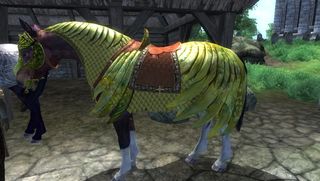
Elder Scrolls IV: Oblivion marked the start of a new era of gaming in more ways than one. It brought many into then-new-gen gaming, sold people on the Xbox 360, and notoriously set the bar for insulting DLCs. Oblivion's Horse Armor is a famously poor example of downloadable content, charging players $2.50 / £1.70 for some extra equine protection that did absolutely nothing besides make your four-legged ride glimmer in the sunlight. It quickly became a cautionary tale in how not to handle DLC- but that 2006 offence to gamers' wallets seems quaint when compared to some of the downloadable mistakes that followed.
Despite consumer backlash, publishers always seem a little too willing to test the limits of how much they can charge for additional content. And consumers have always been ready to let them know where that limit is. Read on to see some of the most ludicrous enhancements gaming has seen in the recent past...
Asura's Wraths final episodes
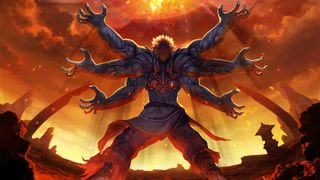
You won't hear me complaining about Asura's Wraths on-disc content. It's an entertainingly excessive quest for revenge fuelled by one man's unending rage, all told in a clever episodic structure influenced by anime. It's a great story, so you think I'd be hyped for more episodes being offered as paid DLC. However, the excitement recedes when you realize you're paying $7 / £4.69 for the actual ending to the game.
Spoiler warning: The campaign ends with Asura discovering who's really responsible for all the horrible things that happened to him. At first it seems like setup for a sequel, but Asura's final battle with his nemesis and any actual sense of closure or resolution are all available for purchase in Episode Pack: Part 4. Perhaps worse than ransoming off the finale is the fact that the main campaign's hard-to-unlock secret ending acts as nothing more than a preview of said DLC pack. That's like finishing the Harry Potter and the Deathly Hallows with a link to a website where you can buy the last two chapters.
Tiger Woods PGA Tour 13's golden courses

Tiger Woods is famous for two things - extramarital affairs and no-nonsense golf. You'll find a good deal of the latter in his sim-heavy sports games, featuring as many real-world courses as fans can get their hands on. And those fans are fine with working to unlock extras - but not if the game constantly reminds you that you could just pay $5 to get it right now, as is the case with Tiger Woods 13.
Even if you buy the full game, 14 of its courses can't be touched unless you spend currency, either in-game or real cash. But the hard-earned in-game gold only unlocks one 18-hole round at a time, and if you want to fully unlock said courses it takes an ungodly amount of effort and skill to complete the necessary challenges. Concurrently, as you're slaving away on the green, the game is quick to remind you that it could all be skipped with a little extra cash. If this seems like EA execs chose to follow the poor example of freemium Facebook and iPhone apps, that's because, well, they did.
WWE 2K's Accelerator
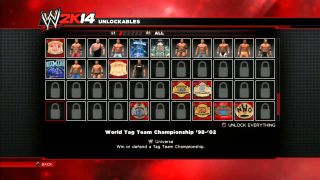
WWE is sports entertainment, which is PR-speak for pro wrestling. That said, the recent WWE games are certainly acting like sports games, with annual releases and cover athlete photoshoots, and they have an unfortunately similar approach to DLC. Beyond the expected season pass, the last two WWE entries include a paid-for bonus called the Accelerator. That may sound like it makes wrestlers move at triple speed, but its a bit more insidious than that.
Sign up to the GamesRadar+ Newsletter
Weekly digests, tales from the communities you love, and more
WWE games have hundreds of unlockables, including dozens of playable superstars, and you normally get them by completing the single-player mode's numerous objectives. It can take a long, long time - especially when facing the nigh-unbeatable John Cena - but for $2 / £1.59 you can save yourself all those hours with the Accelerator, which unlocks it all instantaneously. It's arguably a low price, though it feels a bit more devious than consumer-friendly, especially when unlock-everything codes were free in older games. The Accelerator is a necessity for gamers with limited time on their hands, working like a tax for anyone that want every possible exhibition match-up immediately.
The Saboteurs' nipples
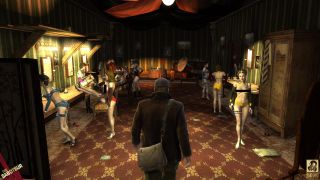
The Saboteur tries its best to make something fun out of the extremely depressing idea of freeing occupied France during the second World War. Killing Nazis as an Irish racecar driver certainly sounds like a hoot, as does the idea of the leading man hiding out in a Parisian burlesque house. It's the setting to some risque scenes, along with one of gaming's most ridiculous concepts: DLC nipples.
See, the ladies of the Belle de Nuit strip club are fittingly underdressed for their profession, but their nipples are usually covered by pasties. If (for some reason) you wanted to go the extra mile and see absolutely everything above the digital waistline, that'll cost you an extra $3. You have to give EA credit for finding a new avenue to collect a few extra dollars via a player's libido. The Saboteurs' servers have since been shut off, and the topless DLC has vanished as a result, so count yourself lucky(and a little ashamed) if you were able to get into this exclusive club before then.
Dragon Age: Origins' conversational microtransactions
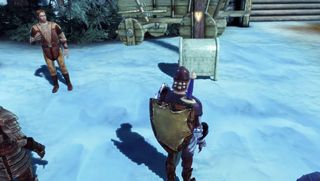
BioWare makes massive RPGs and is also known for selling extra story missions of varying spaces and sizes. Dragon Age: Origins was one of BioWares earliest games to normalize this DLC practice, which is fine if that story content is optional (looking at you Mass Effect: The Arrival). However, I'd say it gets obnoxious when an NPC villager becomes a walking billboard for additional content.
As you walk around Redcliffe Village, you'll spot a number of characters with a highlighted objective over their head. Talking to them will further your quest, but one unnamed man starts giving you all the details on a certain quest, then ends with a plea to start the quest by purchasing it with real money. Much like a play would be ruined by an actor stopping mid scene to beg the audience for spare change, this type of DLC destroys the immersion instantly. Would it have been such a crime to simply put that in a menu instead, or was that not aggressive enough for the corporate suits?
Final Fantasy: All The Bravest's randomized characters
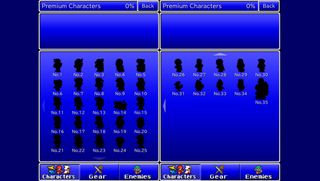
This iOS game may seem like a trifle, but it actually represents the current low point in Final Fantasy's long history. The simple touch interface appears inoffensive, but just beneath the surface are some of the cruelest microtransactions imaginable. Not only are you faced with waiting hours to revive your team or paying Square Enix money to bring them back immediately, but DLC characters are insultingly locked behind a random lottery.
Standard Operating Procedure for DLC: Game X offers to unlock character Y for price Z, which you either pay or don't. If you're playing All The Bravest and want to add Final Fantasy 7 star Cloud Strife to the game, you can pay $1 and maybe unlock him as a randomly pulled character from the 35 unlockable possibilities. If you're particularly unlucky and get every character but Cloud, you'll spend more than $34 before you can play as the spiky-haired icon. Having to gamble to unlock characters that would've been freely unlockable a decade ago is pretty obscene, even by mobile game standards.
Sonic Adventure's DX Upgrade

Sonic Adventure was celebrated when it hit the West in 1999, only to be widely judged as overrated when an upgraded version came to the GameCube in 2003. Because one re-release simply wasn't enough, gamers would get a whole new chance to re-examine Sonic's Dreamcast premiere when Sega ported the game to PS3 and 360 in 2010. Unfortunately, it costs you some extra green to get the complete version of this HD remake.
For about half of the games $5 asking price, you can buy Sonic Adventures DX Upgrade, which unlocks all the extra missions and modes that were in the GameCube edition. Of course, that DX version update isn't all that complete, because the GC release came with several unlockable Game Gear games, none of which are included with the DLC. And really, why would Sega give away those games today when they can just sell them in a separate collection?
Transformers: War For Cybertron's digital toys
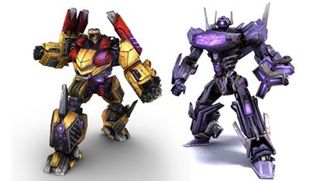
As an American child growing up the 1980's, television instilled in me a near-endless love for Transformers, be they toys, cartoons, or games (but I draw the line at Michael Bay films). War For Cybertron is a loving throwback to the Transformers of my youth, crafting a surprisingly serious tale of Autobots waging their battle to destroy the evil forces of the Decepticons. You could even reskin the robots to look like their classic 80's characters, but only if you bought your game from a specific retailer (or waited for an unspecified amount of time).
As I documented back in 2010, you had to buy WFC from specific retailers to unlock classic designs of the likes of Jazz and Demolisher, or you paid a crazy price for those codes on sites like eBay. Short of buying the game multiple times at different outlets, there was no other way for die-hard fans to play as some of the most beloved Transformers - at least, not at first. Months later, and without warning, Activision made all those skins available in a couple of $5 DLC packs, which must have felt real nice for all the folks that paid $200 for them mere weeks earlier. Maybe next time you can give your biggest fans some advance notice before they spend a small fortune just to play as Shockwave?
Want another 3 entries? That'll be $4
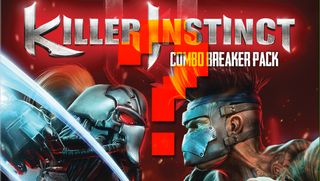
Just kidding! But if you recall any DLC that you found unforgivable, tell me all about it in the comments. I promise, there are no hidden fees to do that.
Hungry for more rip offs? Check out ways video games have ripped off the Alien movies and 10 games we're glad blatantly ripped off the Zelda series.
Henry Gilbert is a former GamesRadar+ Editor, having spent seven years at the site helping to navigate our readers through the PS3 and Xbox 360 generation. Henry is now following another passion of his besides video games, working as the producer and podcast cohost of the popular Talking Simpsons and What a Cartoon podcasts.
Most Popular




